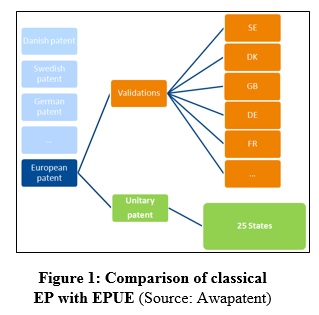
COST IMPLICATIONS OF THE PROPOSED UNITARY PATENT REGIME
Published on 28 March 2016
 The European Patent Office (EPO) is making good progress towards implementing the proposed unitary patent system, also known as European Patent with Unitary Effect (EPUE). EPUE is expected to make patent protection “cheaper and easier for businesses and inventors anywhere in Europe”, with simplification of the translation requirements being one of the major benefits. Current European Patent (EP) legislation requires the validation of an EP in member countries of interest (Figure 1), a process that involves significant translation costs. Even with the London Agreement in place, a translation of the complete specification is still required in 17 of the 38 contracting states. It has been estimated that validation costs could be as high as 32,000 Euros, 70% of which is due to translation alone (Victor Lerenius, 2011). EPUE, on the other hand, has only one translation requirement (translation into English if EPO proceedings took place in French or German, or vice versa).
The European Patent Office (EPO) is making good progress towards implementing the proposed unitary patent system, also known as European Patent with Unitary Effect (EPUE). EPUE is expected to make patent protection “cheaper and easier for businesses and inventors anywhere in Europe”, with simplification of the translation requirements being one of the major benefits. Current European Patent (EP) legislation requires the validation of an EP in member countries of interest (Figure 1), a process that involves significant translation costs. Even with the London Agreement in place, a translation of the complete specification is still required in 17 of the 38 contracting states. It has been estimated that validation costs could be as high as 32,000 Euros, 70% of which is due to translation alone (Victor Lerenius, 2011). EPUE, on the other hand, has only one translation requirement (translation into English if EPO proceedings took place in French or German, or vice versa).
Apart from validation and translation, EPUE will also have cost implications with regards to renewal fees and patent enforcement. Unlike current legislation that requires applicants to pay separate renewal fees in each country after national validation, only one set of renewal fees will be required. A business-friendly renewal fee pattern has been adopted, that corresponds to the sum of the renewal fees which would be paid for France, Germany, the Netherlands, and the United Kingdom (may possibly be revised after four years). Likewise, patent disputes can also be settled at a pan-European level, instead of allowing each country’s national law to take its own course.
However, there are still a few challenges that need to be overcome before EPUE can see the light of day, the most important of which is the ratification of the Unified Patent Court Agreement by at least 13 EU members. With Finland becoming the ninth country to ratify it in January 2016, the agreement now requires further ratification from four more members, including Germany and the United Kingdom, in order to become fully operational. Draft legislation to amend the UK Patents Act has already been published by the UK Government and is awaiting approval from the Parliament.
In the meantime, Quantify IP’s tools can help you accurately estimate the hugely variable costs of validation and translation, thus ensuring peace of mind and facilitating budget planning.

 for assistance.
for assistance.

